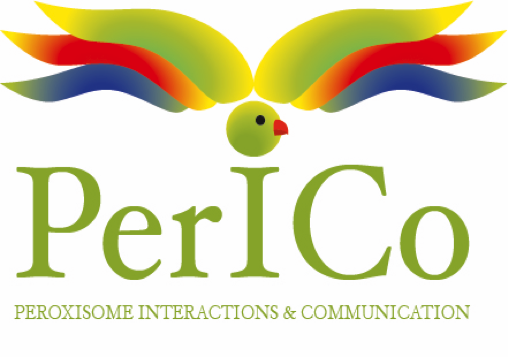4 Million Euro for EU-funded MARIE CURIE INNOVATIVE TRAINING NETWORK

Groningen, 1 October 2018 – The Marie Curie Innovative Training Network (ITN) PerICo announces the start of a new, four-year, research programme on Peroxisome Interactions and Communication. PerICo is a multi-partner European Training Network under the European Union programme Horizon 2020 with a total budget of 4 Million Euro, coordinated by Prof. Dr. Ida van der Klei (University of Groningen).
PerICo fosters education of Early Stage Researchers (ESRs) in projects aimed at uncovering how peroxisomes, important cellular organelles, participate in the intricate cellular interaction and signaling network. In light of the current understanding of the central role of peroxisomes in a variety of metabolic diseases, cancer and aging – this timely research programme will benefit society. This ITN will train 15 ESRs at world-leading academic institutions, including university hospitals and companies, thus forming strong interdisciplinary links between industry, life/medical sciences, and end-users.
PerICo aims to train a new generation of highly-qualified ESRs with entrepreneurial competencies in modern Life Sciences through state-of-the-art research projects focusing on the identification and functional characterization of peroxisomal membrane contact-sites and transporters. In addition, it will use this knowledge to develop novel leads for drug discovery and therapies for the growing list of serious human diseases in which peroxisomes have been implicated.
The new field of organelle interactions requires highly skilled scientists who have expert knowledge in interdisciplinary fields (e.g. cell biology, biochemistry, systems biology and medical sciences), different organelles, or more than one model organism to optimally translate their research data to other disciplines and sectors, including medicine. This ITN will support this interdisciplinarity by establishing a strong, multidisciplinary and inter-sectoral training network, thereby developing technologies tailored to solve key questions in organelle biology. PerICo will exploit recent developments in high-throughput and genome-wide screening technologies, combine these with modern molecular cell biology and systems biology, and ultimately translate the data into new leads for drug discovery and therapy. This specific cross-disciplinary training programme will educate young scientists to a next level, which is needed to advance this research field for the upcoming decennium and to efficiently translate findings into applications. The training programme will be complemented with a focus on scientific soft skills that should promote the capacity of ESRs to also communicate their work optimally to the general public, investors and other scientists.
Full partners of this ITN are the University of Groningen (Prof. Dr. Ida J. van der Klei), the University Medical Center Groningen (Prof. Dr. Barbara M. Bakker), the Academic Medical Centre Amsterdam (Prof. Dr. Hans R. Waterham), the University of Leuven (Prof. Dr. Marc Fransen), Lambert Instruments BV (Jeroen Wehmeijer, Prof. Dr. Lambert Schomaker), LifeGlimmer GmbH (Prof. Dr. Vitor Martins dos Santos), the Ruhr-University Bochum (Prof. Dr. Ralf Erdmann), the University of Exeter (Prof. Dr. Michael Schrader), the University of Freiburg (Prof. Dr. Bettina Warscheid), and the Weizmann Institute of Science (Prof. Dr. Maya Schuldiner).
Partner organizations include Biofaction KG (Dr. Markus Schmidt), the Hospital for Sick Children (Dr. Robert Bandsma, Dr. Peter Kim), MS-Omics (Dr. Morten Danielsen), Novartis (Dr. Dominic Hoepfner) and Oroboros Instruments (Dr. Erich Gnaiger).
For further information contact Ida van der Klei ( i.j.van.der.klei rug.nl ) or visit the website www.itn-perico.eu .
| Last modified: | 04 October 2018 12.42 p.m. |
More news
-
25 April 2025
Leading microbiologist Arnold Driessen honoured
On 25 April 2025, Arnold Driessen (Horst, the Netherlands, 1958) received a Royal Decoration. Driessen is Professor of Molecular Microbiology and chair of the Molecular Microbiology research department of the Faculty of Science and Engineering at the...
-
24 April 2025
Highlighted papers April 2025
The antimalarial drug mefloquine could help treat genetic diseases such as cystic fibrosis, Duchenne muscular dystrophy, as well as some cancers.
-
22 April 2025
Microplastics and their effects on the human body
Professor of Respiratory Immunology Barbro Melgert has discovered how microplastics affect the lungs and can explain how to reduce our exposure.
